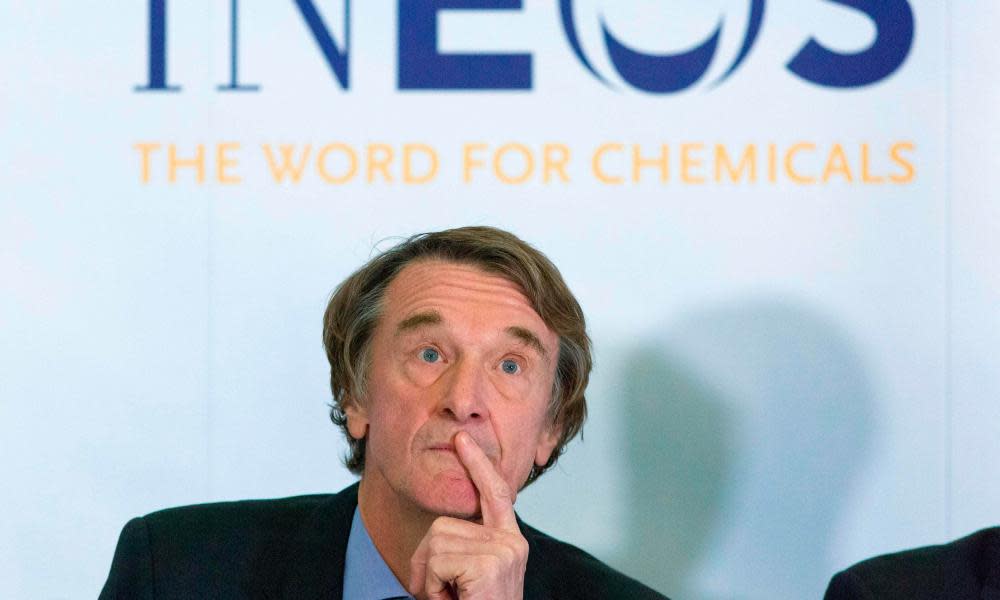Ineos faces legal challenge over plans for plastics plant in Antwerp

The British petrochemicals company Ineos is facing a legal challenge over plans to build a giant plastics plant in Antwerp.
The legal NGO ClientEarth, acting with 13 other NGOs, on Friday launched an appeal against Antwerp’s decision to grant Ineos a permit to build a chemicals installation to make ethylene from fracked US shale gas, the Guardian has learned.
Ineos’ billionaire owner, Sir Jim Ratcliffe, announced a €3bn investment in Antwerp in January 2019 at a signing ceremony with top Flemish politicians. “We’ll become stronger in Europe as a petrochemicals player,” said the businessman, an ardent Brexit supporter, who lives in tax-free Monaco.
Acting for 13 green NGOs, including Greenpeace and WWF, ClientEarth said the project has not met the EU legal requirement of a full assessment of the impact on the environment, including greenhouse gas emissions and wildlife.
“We already have more plastics than we need,” said the ClientEarth lawyer Tatiana Luján. “Beyond the local effects on nature and health [Ineos] project one would cause, we cannot ignore that the basis of this project is fossil fuels, and they’ll be used to create the building blocks of plastics.”
The NGOs say the project will fuel the production of single-use plastics, thus failing to match the requirements of EU waste reduction strategies and climate commitments. Antwerp authorities, which granted the permit last December, are also accused of having failed to consider the plant’s lifetime greenhouse gas emissions, as well as the damage nitrogen pollution would wreak on local wildlife.
Separately, the Dutch province of Zeeland announced this month that it would appeal Antwerp’s decision, arguing that “no appropriate assessment has been made” of the impact of increased nitrogen on its nature reserves.
Flanders is already suffering from excess nitrogen, a result of intensive farming and industry, according to local NGOs. Across the north-western Belgian region, nitrogen emissions have turned purple heather into straw, clear water into brown sludge and accelerated the disappearance of flowers, bees and butterflies.
Ineos says the ethylene “cracker” is the largest petrochemicals investment in Europe for a generation and will create 450 jobs on site and up to 2,250 in other companies. Construction is scheduled to begin later this year at the port of Antwerp, where the company has its roots.
Using intense heat and pressure, the installation “cracks” the bonds in ethane gas to create ethylene, which can then be turned into polyethylene, used to make packaging and plastic bottles.
Ineos disputes the claim the cracker will fuel single-use plastics, highlighting that ethylene can also be used to make water and gas pipes, healthcare products, lighter cars and blades for wind turbines.
It also claims that ethylene buyers could save 2m tonnes of CO2 emissions a year by buying from its plant, rather than older rivals.
The NGOs are unconvinced. “Maybe this plant will be more carbon efficient than other crackers that we have,” Luján said. “But crackers have a lifetime. If you create a new one you lock in the extraction of fuels and the production of plastics for another 30 years, when what we should be doing is scaling down on our use and production of petrochemicals for plastics.”
The EU has pledged to phase out some single-use plastics, including cutlery, cotton buds, straws and stirrers, but campaigners fear a tide of cheap fracked US shale gas will create a new boom in plastics.
Others say anti-plastics regulation could mean the industry over-expands, leaving taxpayers on the hook as expensive installations are no longer needed and become stranded assets.
“One of our biggest fears is that we not only use Flemish taxpayer money to guarantee an economic activity, which is such an ecologically bad thing to do right now, but that we will be linked to an economic activity that is not as economically viable as first thought,” said Frank Vanaerschot, of FairFin, one of the NGOs backing the case.
The Flemish region enticed Ineos to build the cracker with a government guarantee worth €250m-€500m (£209m-£418m), according to local media, although that was before the project was scaled back.
Last year Ineos announced it was putting on hold plans to produce propylene at Antwerp, another raw material used to make plastics.
Vanaerschot fears the plant creates perverse incentives for Belgium, which is not on track to meet its 2030 climate targets. “There will be a conflict of interest between having strong ecological regulations – which we really need – and the economic interests of this company.”
A spokesperson for Ineos said: “We have submitted a comprehensive permit request of thousands of pages. The province of Antwerp has granted us the permit [at the] end of last month in close consultation with multiple other authorities and after a rigorous process and thorough review.”
The assumption the cracker would only be used for single-use plastic was “simply wrong” the spokesperson added, highlighting ethylene’s end use in numerous products such as insulation materials, mobile phones and Covid self-tests.
The spokesperson added that the cracker would have the lowest emissions of all such installations in Europe, encouraging the industry to become greener. “Do we want renewal to happen in Europe or do we want to just keep the status quo and have our industry offshored to regions where environmental standards are far less stringent?” they asked.

 Yahoo Movies
Yahoo Movies 
